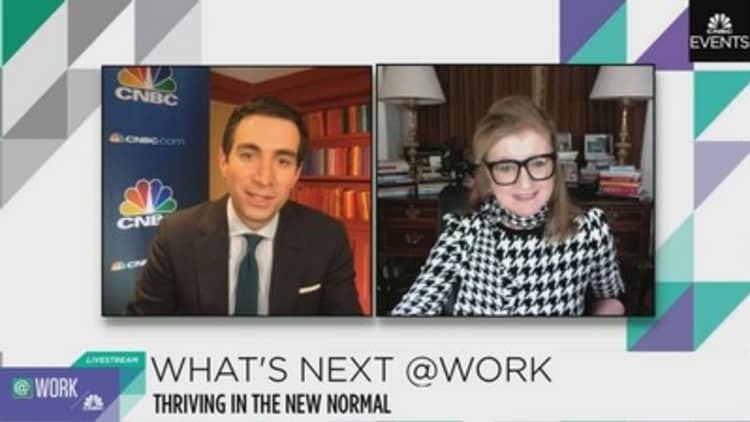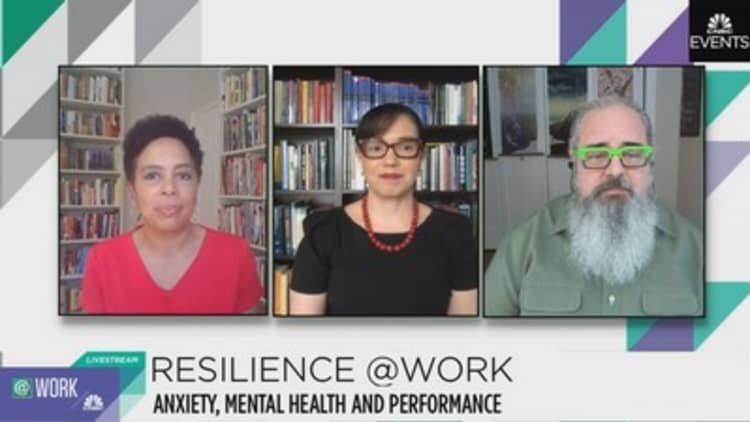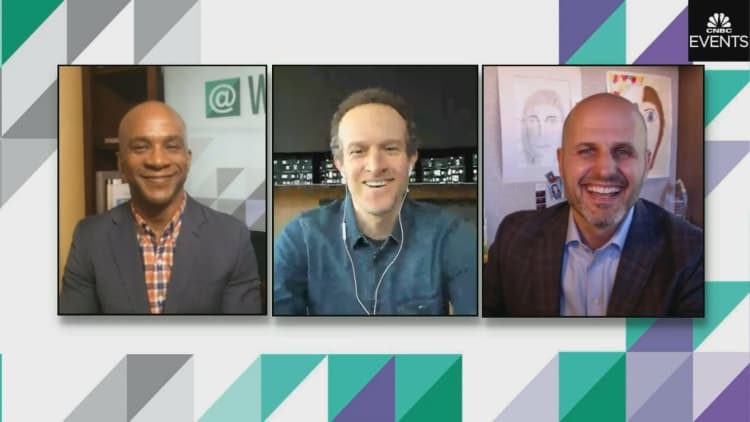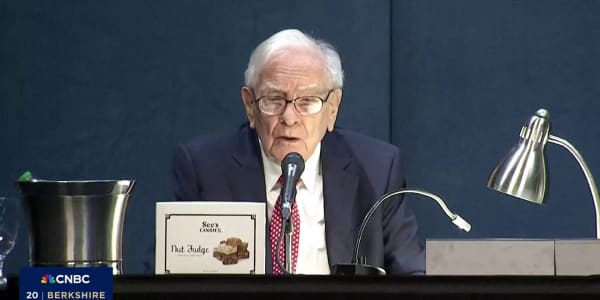Working from home is supposed to be great and remove sources of daily stress. For workers fortunate enough to have jobs that can be completed at home, the days of long commutes and sitting in traffic, too close for comfort cubicles where everyone is in each others' business, at the business, can increase the desire for more remote days on the calendar. Now, 42% of U.S. workers who did not telecommute previously are doing so now, according to a CNBC All America Survey released this week. And as the coronavirus creates a massive shift to remote work, it is an increasing source of stress, and that has implications for employee and business productivity.
"We are frazzled when we are exhausted, it's super hard to be empathetic. And it's very hard to be creative and deal with the growing stresses of living in this very uncertain time," said Arianna Huffington, founder and CEO of Thrive Global, on the recent CNBC @Work livestream event, Leadership & Management Amid Crisis.
Coronavirus outbreak curve charts and death rates, as well as stock market volatility, add to what Huffington says is a "generic atmosphere of stress."
The stressful stages of working from home
Work from home is now a societal experiment on a scale never before tested. And Huffington's company, along with SAP and its experience management company Qualtrics, are tracking the stages of working from home amid a pandemic. The survey software is now being used by over 7,600 companies.
Many employees across the country are now well beyond the first week of working from home and that's when the problems start to surface, Huffington says.
"The second week is when a lot of the problems start setting in, ranging from aches and pains because you've been working from your couch, to the COVID-19 you know, putting on weight because you are stress eating and a refrigerator is too close."
In week three, workers start to create new structures. Huffington says part of those new structures should be "micro steps" to help build physical immunity and mental resilience.
"We have all the data that shows that building immunity is going to be critical in dealing with a virus if we're exposed to it, and in determining how serious it's going to be. And unfortunately, all the same things that we've been talking about that are important in normal time sleep, avoiding sugar, moving and avoiding a barrage of negative thoughts, are now more important than ever and harder than ever," she said.

Stress is unavoidable in the best of times, and especially so now. Huffington said it takes 60 seconds to course-correct from stress, and that is an important micro step. "All of us are getting stressful news throughout the day. Instead of just going from one [virtual] meeting to another, take literally 60 seconds to breathe deeply and consciously and course correct. It sounds very simple, it's meaningful, and it makes a real difference and it takes 60 seconds, so it's not too long."
Movement really matters, too, Huffington says. "People are having a super hard time moving. So create an alarm, where you get up every hour. And even if you just move around your desk or take, make some of your calls, while walking. Some strategies that actually help you move."
Huffington said because remote work is solitary it is important to create an accountability buddy at work so you can support each other and check in on each other. "Have you moved today? How many Oreo cookies have you had? And have you thought of swapping some of your sugary favorites with something else. ... micro steps and support," she advised during the CNBC @Work livestream event.
Take time to disconnect
Apple co-founder Steve Jobs said his best ideas came after meditation. Many of us, according to Huffington, even if we don't meditate, can testify to the fact that our best ideas come in the shower, or while drinking wine, or fly fishing.
"Basically, once we're disconnected from our screens, and all the ways in which we are hyper connected in our modern life," Huffington said. "One of the fundamental delusions that has been driving us all, which is that in order to be successful, we basically need to be on all the time, I think that's going to be completely sacrificed. Because we are all saying much more clearly the price we pay for that."
This is a message she said needs to be communicated to all employees. "We need to give all employees cultural permission to speak up and tell us what they need. And that means, if your child suddenly needs you, and because of what happens in your life under or because they are not feeling well, then that employee needs to feel that they have the permission to reach out to their manager and say that they will be offline for whatever reason."
One of the fundamental delusions that has been driving us all, which is that in order to be successful, we basically need to be on all the time, I think that's going to be completely sacrificed.Arianna Huffingtonfounder and CEO Thrive Global
Leaders are now more stressed than ever, too, and need just as strongly as their employees to disconnect.
"A lot of the things that we hear in normal times like, 'I'm working 24 /7, I'm always on, I can't disconnect, there's so much on my plate,' are now almost universal. So we need a new playbook of leadership," she said.
She says the first step for leaders is to stop believing that in order to be a great leader, we need to be on 24/7. "That's almost always a recipe for not being a great leader because the first thing that disappears, when we are depleted, is our creativity and our ability to innovate in moments of crisis. Remember, everything may appear urgent, but not everything has the same urgency. ... Prioritize between what is truly important for the business, for your employees, and what appears incredibly urgent."
The alarming science of stress
Harvard psychologist Luana Marques, who is director and founder of Community Psychiatry PRIDE at Massachusetts General Hospital and an associate professor in psychology at Harvard Medical School, said from a scientific perspective when there is a real threat — and the coronavirus qualifies — our body goes into fight-or-flight mode. There is a fear response that happens naturally. "And quite quickly, immediately, our limbic system goes on, the emotional part of our brain, and it gets us ready for fight, flight or freeze."
The consequences are that thinking in the brain decreases. "We really can't focus," Marques said on the @Work livestream event. "So one of the things that we're seeing right now is a lot of us working from home. A lot of our workforce is hitting against this wall when they're trying to be productive. They're trying to do a lot, and really, they don't have as much brain capacity, as much thinking capacity as they had before."
Former Google performance guru Bill Duane, who now runs his own consulting firm with a focus on organizational well-being, said on an individual level the biological predisposition toward a stress response in the face of threat or perceived threat is the reality for every individual, not a character flaw.
Historically, the workplace has viewed emotions like anxiety and fear or anger as complexity that has to be removed. That's the wrong approach, according to Duane. What's needed to deal with this complexity is clear: calm thinking, empathy, innovation, creativity. Duane said we have an opportunity to not only get through a crisis but also the possibility of making real, positive systemic change.

"In order to do that, we actually need to accommodate these challenging emotions and not suppress them," Duane said. "If you've been feeling anxious, you're not doing this poorly. You're having a natural and reasonable response to economic stress, to health stress, to relationship stress."
Whatever makes an individual feel more calm needs to be a focus, and that can be exercise, sleep, or meditation, and many other activities. "The list is really, really long about what works. The key is to find what works for you," Duane says. "Find something that uplifts you. And then do it. ... And in the context of the workplace, realize that this is not optional."
Marques said in the current situation, the stress is becoming chronic rather than acute, and that keeps our bodies on a heightened response level, which reduces our brain's productivity. "We need to bring that response down. That's one of the things we have to control," she said. Creating a new work-from-home norm based on existing baseline of what individuals did previously is important. Simple things, like getting dressed, are anchors for a new norm.
"You really need to anchor on the things that you know, small things that you can do every moment that brings more dopamine into your brain that gets you feeling happier." She added that these individual changes are key to reducing household stress as well. "We need to be able to regulate ourselves so that we can regulate those around us."
The end of endless office meetings
Company culture is under threat as more workers go remote. Recreating the actual office at home is not easy. It is, in fact, a mistake to even try, says Jason Fried, co-founder and CEO of organizational platform Basecamp. "That's what people are struggling with right now. They're not really transitioning; they're scrambling to figure out how to do this."
Fried expects more of a hybrid situation to become a permanent fixture of work, with more flexibility for employees to be remote, and that will require even more effort to maintain a single company culture. Work tool use should be consistent whether in the office or remote. "You want to make sure everyone's using the same thing and communicating the same way."
Basecamp is already a hybrid company. It has an office, but most people work remotely, and as a result, Fried said the company does not hold in-person meetings. "In-person meetings favor the people who are there," Fried said. "It's really awkward to have like three people in one place and one person on the video. So we write things up instead. And we distribute information to everybody the same way, regardless of where they are. So I think that's going to be a really important thing to get used to," he said during the CNBC @Work livestream event.
"People are pretty adaptable," Fried said. "Everyone right now is being thrown into a brand new situation, and they're going to adapt, and in a few weeks, it's going to feel normal, and when we go back to the old way, or the other way, or the hybrid way, or whatever new way comes out of this, that'll be an adjustment as well."

Laszlo Bock, co-founder and CEO of Humu and a former senior vice president of people operations at Google, said he knows of firms where overnight adoption of remote tools has gone from 20% to 90%, with even the workers who long resisted it finally having no choice but to embrace it.
That sudden shift will require organizations to step back and think about what distance means to work. There are various kinds of distance: physical distance, emotional distance, operational distance, and what psychologists call affinity distance, which refers to a sense of trust and compassion and connection. Accessibility of information is part of that, Bock said.
"That's actually the thing that is the most powerful driver of performance, of innovation, of retention, of all kinds of goodness. And that's the thing that's most missing today," he said.
Technology can fill the gap on the operational side of distance, but the affinity needs to come from human beings actually finding new ways to interact. He says small interventions, what his firm calls nudges, can make people generally happier and more productive at work.
"It's just simple reminders that come at the right time, to help you show up better in this incredibly stressful time," Bock said.
His firm offers these reminders, which can arrive by email and text messages, to help improve employee well being, and perform better as team members and collaborators.
Set up a meeting, and have it run on Zoom or Google Hangouts on whatever platform you want, forever. ... Set up a three- month long meeting. So anyone can just pop in when they need support.
One of the most powerful nudges Humu has found during this crisis is a reminder for people to set up what we call virtual watercoolers.
"Set up a meeting, and have it run on Zoom or Google Hangouts on whatever platform you want, forever. ... Set up a three- month long meeting. So anyone can just pop in when they need support. That reinforces affinity and kind of replicates that randomness and serendipity you have where people bump into one another," Bock said.
Bock said another nudge that is resonating, particularly with senior executives, is a reminder to stop for a moment. "Senior executives, you know, I don't want to play the violin for senior executives. But there's difficult decisions being made about the fate of companies and the fate of people. And sometimes a reminder to just kind of take a deep breath and remember, you've got to put your people first, you've got to do the right thing, is just what they needed at just the right time."






